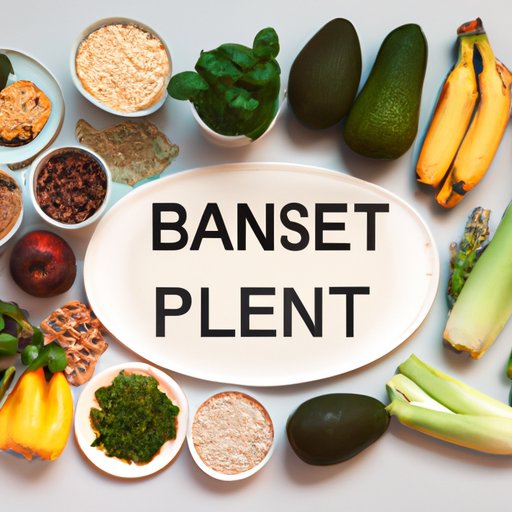
Introduction
If you’re thinking about transitioning to a plant-based diet, you’re not alone. More and more people are recognizing the health benefits of a diet rich in plant-based foods. Whether you’re considering veganism, vegetarianism, or simply reducing your meat and dairy intake, this article is for you. We’ll explore the benefits of a plant-based diet, how to get started, where to find protein sources, how to eat out while staying plant-based, and how to overcome common challenges. Let’s dive in!
The Benefits of a Plant-Based Diet
A plant-based diet has numerous health benefits. Research shows that people who follow a plant-based diet tend to have lower rates of heart disease, high blood pressure, diabetes, and certain cancers. Plant-based diets are also rich in fiber, vitamins, and minerals, and can help you maintain a healthy weight.
Reducing or eliminating meat and dairy products can also have numerous benefits. For example, a plant-based diet can help reduce your environmental impact, as animal agriculture is a leading cause of greenhouse gas emissions and deforestation.
If you’re new to plant-based diets, you may be wondering which one is right for you. Veganism is a diet and lifestyle that eliminates all animal products, including meat, dairy, eggs, and honey. Vegetarianism can be broken down into several categories, but generally involves eliminating meat while still consuming dairy and eggs. Flexitarianism is a newer term that refers to a mostly plant-based diet with occasional meat consumption.
Getting Started
Transitioning to a plant-based diet can be overwhelming at first, but there are several steps you can take to make the process easier. One important step is to plan your meals ahead of time. This can help ensure that you have a variety of tasty and nutritious plant-based foods on hand throughout the week. You may also want to experiment with new recipes and ingredients to keep things interesting.
Grocery shopping is another important part of starting a plant-based diet. Be sure to stock up on staples like fruits, vegetables, whole grains, beans, and legumes. You may also want to look for plant-based milk alternatives like almond or soy milk.
When it comes to cooking plant-based meals, there are numerous techniques and ingredients you can experiment with. For example, plant-based proteins like tofu or tempeh can be used in a variety of dishes, from stir-fries to tacos. Roasting or sautéing vegetables is also a great way to add flavor and texture to meals.
Plant-Based Protein Sources
One of the biggest concerns people have about a plant-based diet is where they will get their protein. The good news is that there are numerous plant-based protein sources that can help you meet your daily needs. Beans, lentils, and tofu are all great sources of protein. Nuts and seeds are also rich in protein, as are some grains like quinoa. You can also find meat substitutes that are made from plant-based protein, like veggie burgers or vegetarian chicken.
Eating Out on a Plant-Based Diet
Eating out can be challenging when you’re following a plant-based diet, but it’s not impossible. One important tip is to do your research ahead of time. Look up menus for restaurants in your area to see which ones offer plant-based options. If there are no vegan or vegetarian restaurants nearby, don’t worry. Many restaurants offer plant-based substitutions or can modify dishes to meet your needs. Just be sure to ask your server for assistance and be clear about your dietary restrictions.
Common Challenges and How to Overcome Them
Starting a plant-based diet can be challenging, especially in social situations. You may feel pressure to indulge in meat or dairy products, or find that your friends and family don’t understand your dietary choices. To overcome these challenges, it’s important to stay focused on your goals and be confident in your decision to follow a plant-based diet. You may also want to educate yourself and others about the benefits of a plant-based diet, or find a supportive community of like-minded individuals.
Plant-Based Diet Success Stories
Transitioning to a plant-based diet may seem daunting, but it’s worth it. To inspire you on your journey, we’ve collected some inspiring stories from people who have successfully made the switch to a plant-based lifestyle. These individuals have found numerous benefits, from improved health to a greater sense of environmental responsibility. Take their stories as motivation for your own plant-based journey!
Conclusion
Transitioning to a plant-based diet may seem challenging, but it’s worth it. Whether you’re looking to improve your health, reduce your environmental impact, or simply try something new, a plant-based diet can help you achieve your goals. By following these tips, staying committed to your goals, and educating yourself about plant-based nutrition, you’ll be well on your way to a healthier, happier you.





